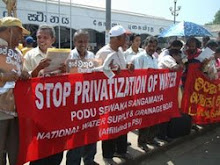
“Aquastat” sheet evaluating the use of water in Paraguay.
There are many participants in the conflict for access to safe and sufficient water supplies as a natural right, and not as a profit for corporations. As stated, the Public-Private Infrastructure Advisory Facility (PPIAF) has been working to privatize water in Paraguay, and especially Asuncion, and has worked with the government to fund consultations with companies such as Essap (formerly Corposana).
Check out the the Asuncion Metropolitan Area Potable Water Project Proposal!
Local Unions, Constituents (as corrupt as the government may be), and activist groups such as Sobrevivencia have been working to combat water privatization. Sobrevivencia in particular has been working toward the New Law on Water, which was passed by the parliament in June 2007.
The regulation of business and industrial activities of Paraguay are established by three ministries. The Ministry of Industry and Commerce, the Ministry of Finance, and Central Bank (Civil Code and Law 1034/83 provide more information). Each new regulation must be approved by each of the three ministries for regulation to be passed—according to the government.
President Nicanor Duarte Frutos was elected in April 2003 (with 38% of the votes ironically enough) and will serve until April 2008 (elections are currently taking place, as of April 21, 2008) and Duarte cannot choose a successor, or serve another term, so power is expected to shift. When Duarte was elected in 2003, he promised to cease the sale of state companies to privatized companies, such as four major companies that had been sold.
However, Jose Alderete was appointed the Minister of Public Works and Communication and Cesar Cruz Roa designated to coordinate the water and telecommunications reform program. Both have worked to develop case-by-case plans which would improve the efficiency of state-owned companies via contracts with private sector management and private capital participation. Although not technically sold to private companies, the management of “public” sectors is being contracted to be done mostly by private corporations.
The plot thickens...
-N

No comments:
Post a Comment